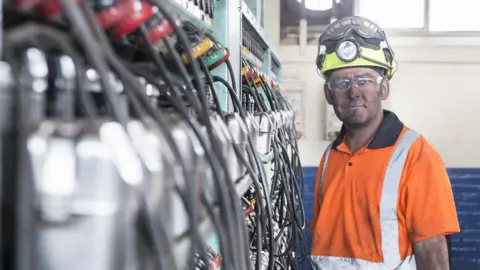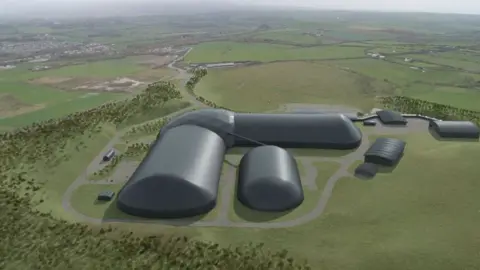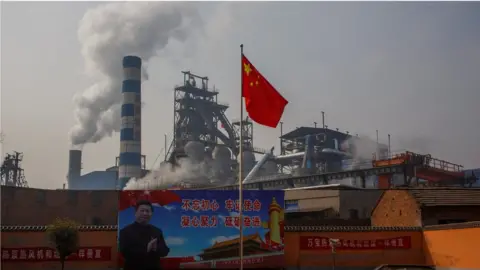Cumbria coal mine: Will it threaten the UK's climate targets?
 Getty Images
Getty ImagesThe government has approved the UK's first new deep coal mine for 30 years.
The Cumbrian plant will provide fuel for steel-making.
Supporters of the mine, near Whitehaven, claim it will create much-needed jobs, but critics argue it undermines the UK's climate change targets.
Does the UK need a new coal mine?
The coal from the mine will not generate electricity, but make steel.
Most steel production involves heating coal to high temperatures and combining it with iron.
It takes about 770kg of coal to make one tonne of steel - and the UK produces 7.4 million tonnes of steel a year.
UK steel-makers currently get nearly half their coal from Russia.
But after the country's invasion of Ukraine, the UK pledged to stop using Russian resources.
However, the government's advisory Climate Change Committee (UKCCC) points out that 85% of the coal produced in Whitehaven is likely to be exported, which may limit its benefit to the UK.
Why is the mine controversial?
The project was initially approved by Cumbria County Council in October 2020. West Cumbria Mining, the firm behind the project, promised to create 500 direct jobs and 1,500 in the wider community.
Critics questioned those figures, but more than 40 Conservative MPs backed the project.
 West Cumbria Mining Company
West Cumbria Mining CompanyHowever, in February 2021, progress was suspended after UKCCC warned the government that steel-making shouldn't use coal after 2035 if the UK wants to meet its climate targets.
The council had granted permission to dig until 2049.
The Planning Inspectorate reviewed the original decision, and sent a report to Communities Secretary Michael Gove - who has now approved the project.
Mr Gove claims the coal mine would "to some extent, support the transition to a low-carbon future".
But UKCCC chair Lord Deben previously called the proposal "indefensible".
He warned that its approval would damage the UK's leadership on climate change, and "create another example of Britain saying one thing and doing another".
The UK hosted the 2021 UN climate summit COP26, where it got countries to pledge to reduce their use of coal.
Dr Sugandha Srivastav from University of Oxford said the new mine's approval will be seen as "extremely hypocritical".
What is the environmental impact of steel?
The UK is meant to cut its greenhouse gas (GHG) emissions - which are responsible for climate change - by 78% by 2035.
In order to do this, the steel industry must cut its emissions: in 2019 it was responsible for 12 million tonnes of carbon dioxide, or 2.7% of the UK's total GHG emissions.
The UKCCC says if steel firms don't stop burning coal by 2035, they will have to use expensive technology to capture the emissions generated and bury them underground.
Are there alternatives to coal?
Chris McDonald, chief executive of the Minerals Processing Institute at the UK's National Centre for Steel Industry Research, told the BBC he doesn't expect coal to have a role in the future.
He said the UK's two big steel plants want to replace it with new low carbon technologies.
Electric arc furnaces (EAF) generate fewer emissions by using electricity to melt scrap steel, which reduces the coal input and the amount of fossil fuels needed for heat production.
Replacing iron with hydrogen can reduce emissions by 61% - from 1.8 tonnes of carbon dioxide per tonne of steel to 0.7 tonnes, according to the OECD.
At the moment, 41% of European steel is produced under the EAF process, while hydrogen is used in 10% of global production.
But the International Energy Agency warns these technologies are not fully developed, and says governments must create a market for "near-zero emissions steel".
Are other countries facing the same dilemmas?
China, India, Japan and the US are the world's biggest steel producers, and significantly dwarf the British industry.
In 2021 China produced more than 1 billion tonnes of steel, compared to the UK's 7.4 million.
 Reuters
ReutersThese large producers all continue to use coal in their steel industry.
But agreements reached at the COP26 climate talks demonstrated a commitment to making progress.
China has set a target to reduce steel production by 3%, and expects the industry's coal use to peak by 2024.
However, the ongoing cost-of-living crisis has led some countries to delay the move away from fossil fuels over fears about rising prices.
